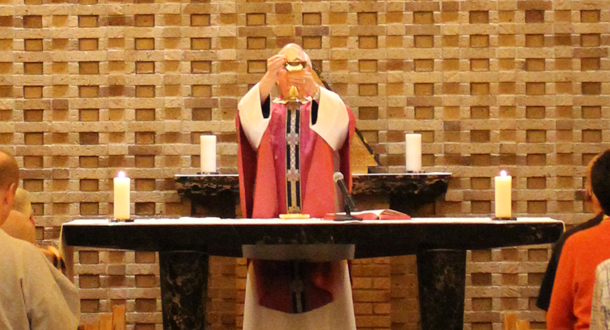
Scripture:
Reflection:
Farewells are rarely joyful. At best, they are bitter-sweet. Bitter because departure pains the heart. Sweet because only through the departure, a kind of letting go, actually, is it possible that something new will emerge. How many countless parents have felt the bitter-sweet experience of leaving their child behind in a kindergarten classroom, or waving goodbye to them as they depart for college? In the loss, there is promise.
I think the disciples felt this way and more acutely so. As they heard Jesus deliver his farewell to them, grief filled their hearts. In their pain, they could not understand what Jesus meant by his words “A little while, and you will no longer see, and again a little while, and you will see me.” In their confusion they asked: “What does he mean by all this?”
Jesus explained in the best way he knew, through the imagery of a woman in labor.
“When a woman is in labor, she has pain, because her hour has come, but when her child is born, she no longer remembers the anguish because of the joy of having brought a human being into the world” (Jn 16:21).
But, Jesus didn’t stop there. He added a promise.
“So, you have pain now; but I will see you again, and your hearts will rejoice, and no one will take your joy from you” (Jn 16:22).
Did the disciples hear what Jesus was trying to tell them? Do we? In using the “woman in labor imagery,” Jesus was tapping into a rich prophetic tradition of hope and promise. Women’s labor pains were frequently used by the prophets as a metaphor for painful times signaling the coming of end-time salvation through a messiah. The Judaism in Jesus’ times had even coined a term, “the birth pains of the messiah,” to describe the tribulation they expected would precede the end-times and the coming of the messiah.
Jesus, in other words, was telling his disciples to cling to his promise. With the crucifixion of Jesus, they would grieve with the pains of a woman in labor. But on the third day, the disciples would see Jesus on the other side of the cross, at this resurrection. And as he promised, their grief became joy, an eschatological joy. Through the Holy Spirit, Jesus would lead his disciples into a new and intimate relationship with God.
We, the people of God, have grieved through Good Friday, have awaited expectantly through the depths of Holy Saturday, and rejoiced on Resurrection Sunday. For us, a farewell is on the horizon; the departure, the Ascension of Christ to the Father. The Church calls us to prepare for it.
We live in the end times. But in the meantime, there is no time for passivity. The fiery Holy Spirit, on Pentecost Sunday, will see to that. We have work to do. A world to repair. The hungry to feed. The homeless to shelter. The naked to clothe. The grieving to comfort. The lonely to touch. We live in broken, turbulent times, amid “the birth pains of the Messiah.” Even as we rejoice in Christ’s resurrection, we wait in expectation for the Second Coming of the Lord. We, who live in bitter-sweet end-times, cling to the promise.
Deacon Manuel Valencia is on the staff at Mater Dolorosa Passionist Retreat Center, Sierra Madre, California.
